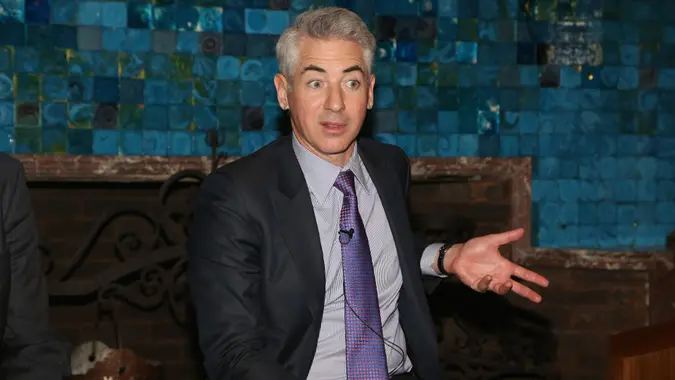Are NFTs Still Viable Investments In 2024?

Commitment to Our Readers
GOBankingRates' editorial team is committed to bringing you unbiased reviews and information. We use data-driven methodologies to evaluate financial products and services - our reviews and ratings are not influenced by advertisers. You can read more about our editorial guidelines and our products and services review methodology.

20 Years
Helping You Live Richer

Reviewed
by Experts

Trusted by
Millions of Readers
Non-fungible tokens (NFTs) — digital assets that represent a wide range of tangible and intangible items and are recorded on a blockchain — reached peak hype a few years ago.
At the time, they attracted massive amounts of money. For instance, auction house Christie’s sold digital artist Beeple’s collage NFT for $69.34 million in March 2021. Other top NFT sales in 2021 included a two-lot Bored Ape Yacht Club (BAYC) auction from Sothesby’s, which realized $26.2 million for 202 NFTs.
Are NFTs Still Viable Investments in 2024?
Following explosive growth, trading volumes of NFTs also took a rapid tumble afterwards — down a whopping 97% in September 2022 from its record high of $17 billion in January 2022, as Bloomberg detailed at the time.
While NFTs sales have been lagging since, as Benzinga reported, an enormous sale occurred in March: CryptoPunk 3100 sold for 4,500 ETH, or $16 million.
And this, Benzinga further noted, could be a harbinger of an NFT revival.
“We’ve certainly seen the NFT market go through a boom-bust hype cycle, with so many PFP-focused [profile pictures] collections soaring, crashing and never recovering,” said Anthony Georgiades, general partner at Innovating Capital.
However, Georgiades also noted that several quality collections have flourished and, in turn, have shown they are likely to endure for the foreseeable future.
“People like digital art, after all, so I suspect this aspect of NFTs will continue to show some strength,” he said.
Less Speculative Market for NFTs at This Time
According to some experts, NFTs’ seemingly resurgence this year is less about speculative hype and more about meaningful, real-world applications.
“NFTs are extending their utility beyond digital art into sectors like gaming, real estate, and digital identity, showcasing their potential for sustainable investment opportunities,” said Lani Dizon, co-founder of Zenza Capital.
Shiti Manghani, CEO of NFT gaming app STEPN, echoed the above notion, saying the true value of NFTs lies in their utility.
“If you believe in a particular piece of utility, then let that guide you. But pure price speculation is never a good reason,” added Manghani.
According to Dizon, there are several pros to investing in NFTs: They have diverse applications, they offer a proof of ownership and they are easy to access through improved platforms.
However, some of the cons, she added, include their volatility, their liquidity issues and the legal ambiguity around them.
No Full NFT Comeback in Sight, Some Say
On the other hand, some experts don’t believe in a full comeback of NFTs.
“The flood of images with questionable value is not happening again,” said Ilya Stadnik, CEO at Zent.
According to him, NFTs could, in some cases, be a good investment — provided careful selection is applied.
“I could say 99.9% of those are not worth considering. As I previously noted, the comeback is not happening, but the new technologies deliver hope for NFT market transformation and further integration into industries like gaming and online entertainment,” he added.
Critics: Not a Viable Investment at All
Finally, some experts never believed in the value of NFTs, arguing that even at their peak they never were viable investments in the past — but instead, vehicles for speculation.
“Distinguishing between speculation and investing is extremely important. Many speculators in NFTs, GameStop (or the other meme stocks) were and are engaging in speculation and not investing,” said Robert R. Johnson, professor of finance at the Heider College of Business, Creighton University. “Speculators can certainly make a great deal of money. But, they also assume a great deal of risk.”
More From GOBankingRates
 Written by
Written by  Edited by
Edited by 

























